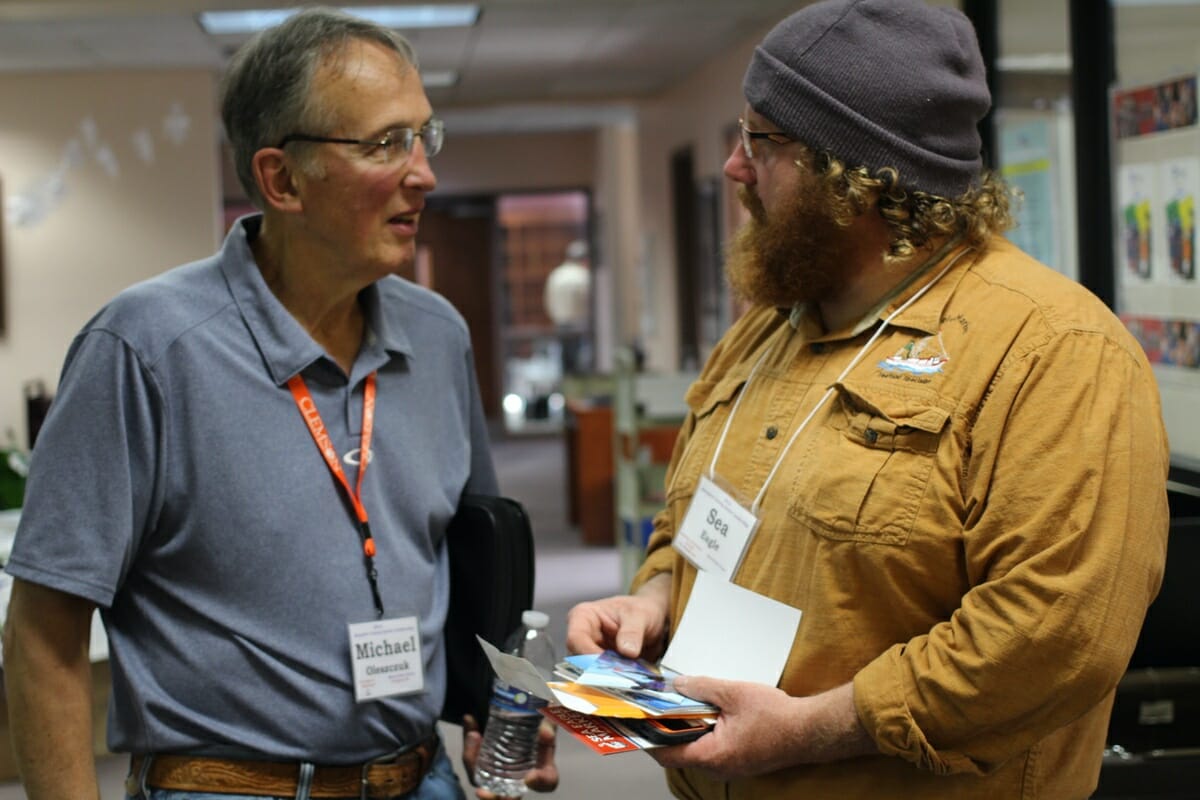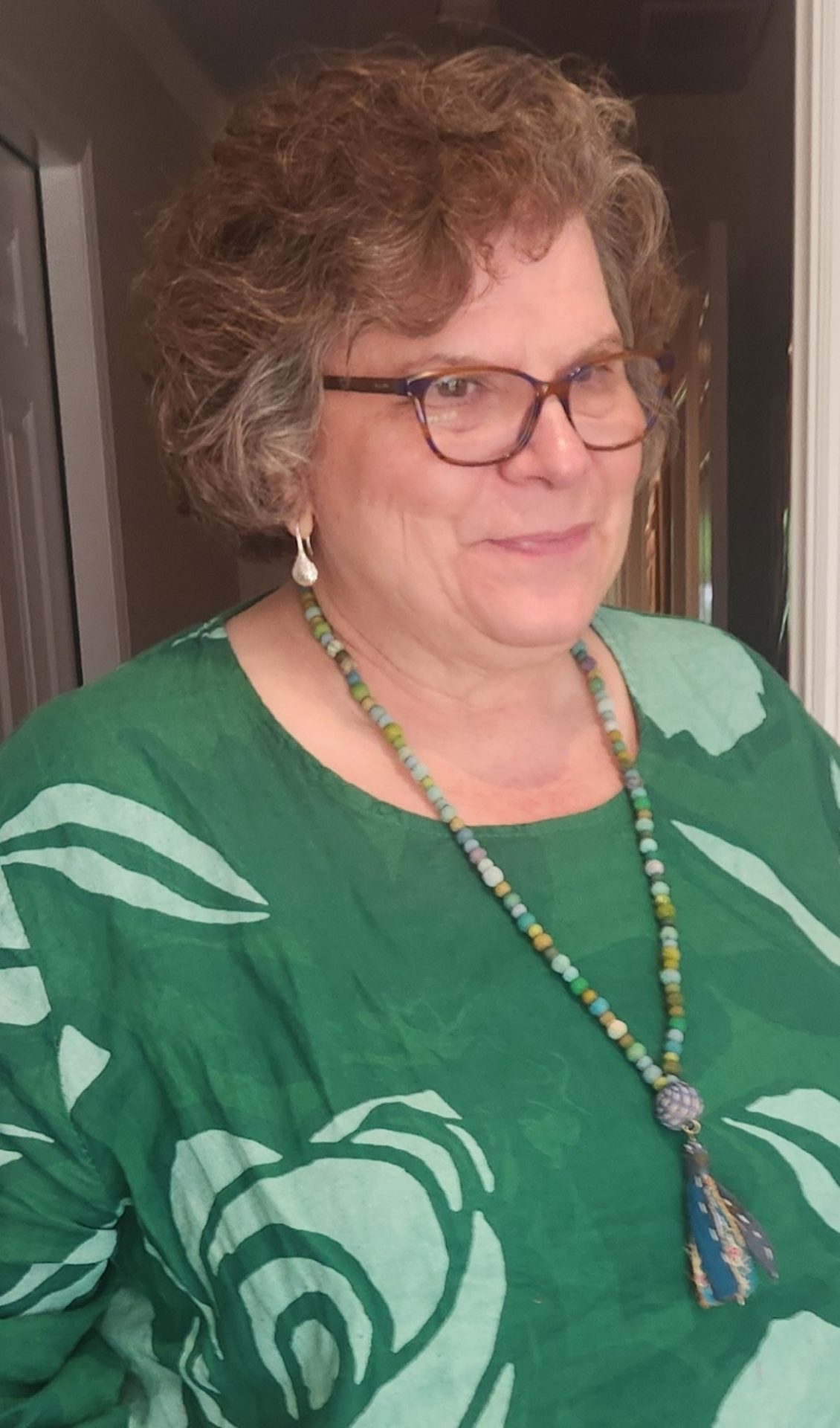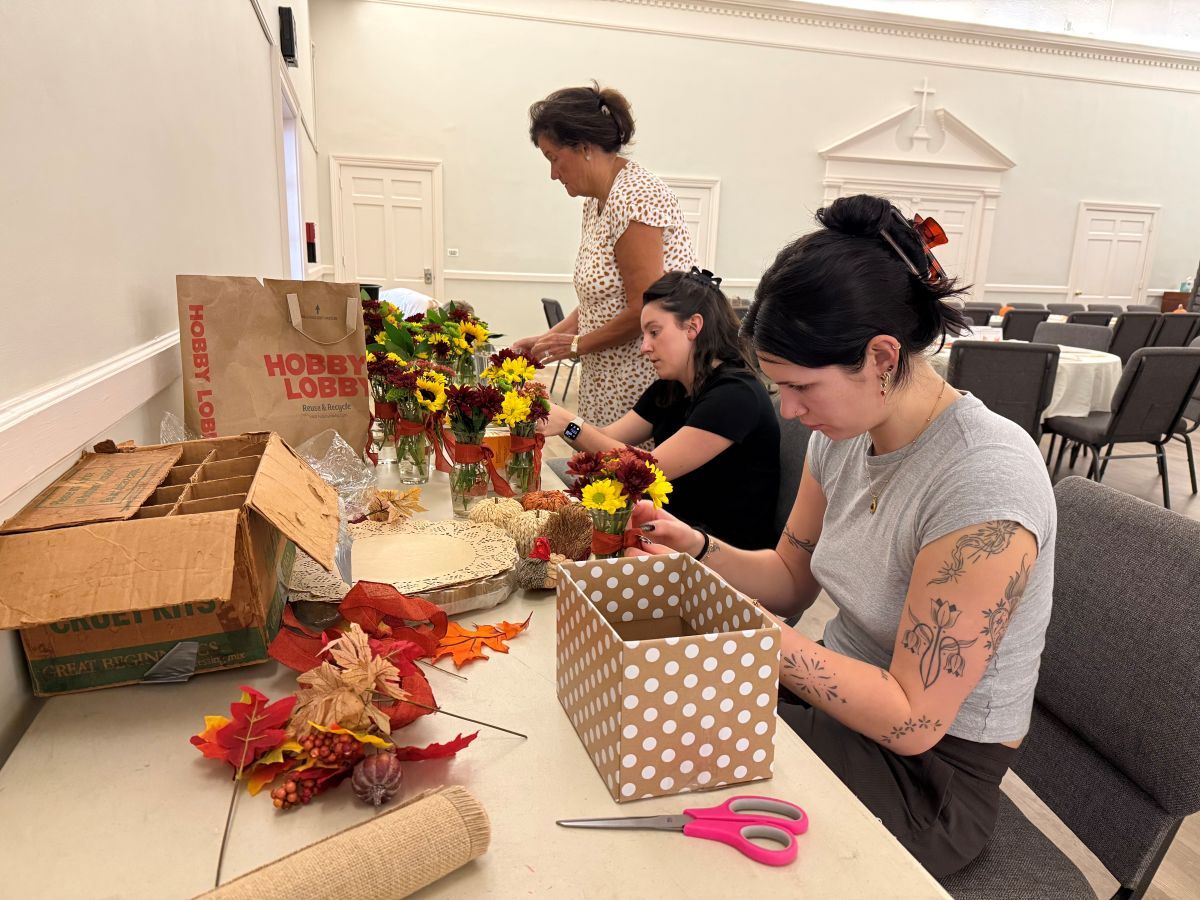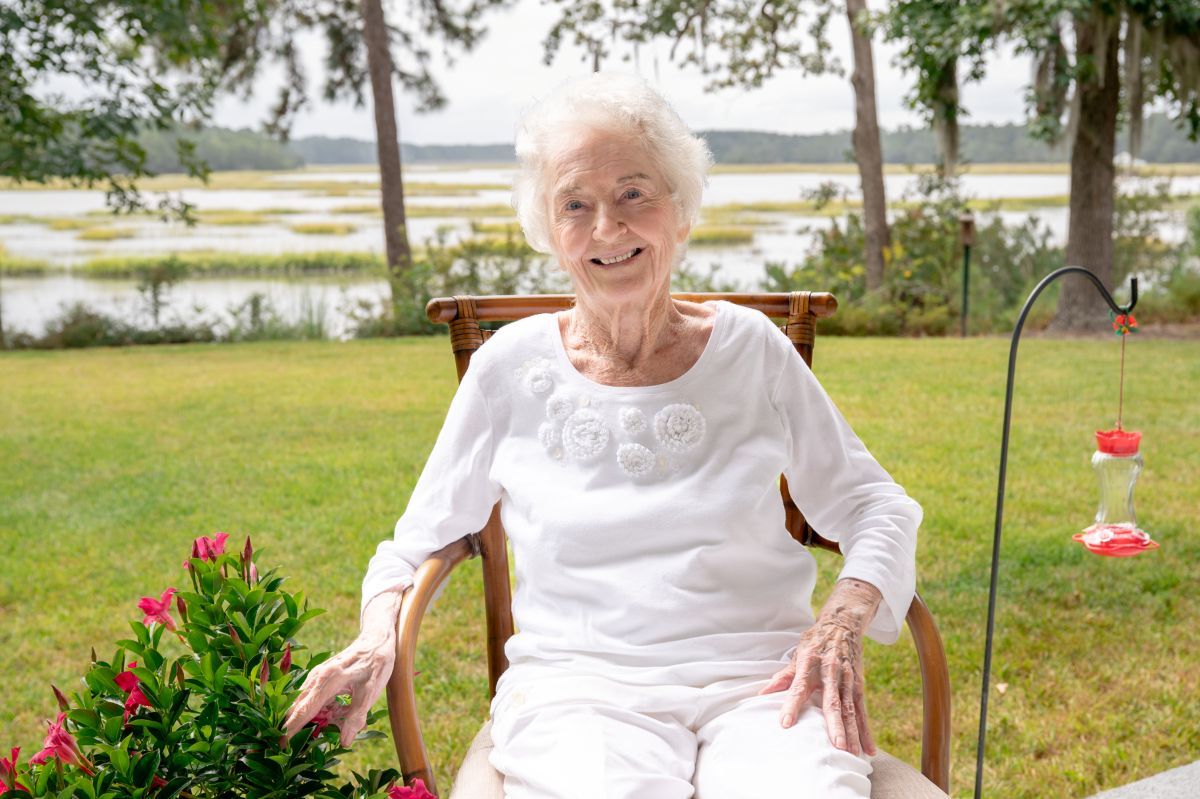Photo above: Leadership student Michael Oleszczuk discusses the seafood industry with Craig Reaves, owner of Sea Eagle Market.
Week 6 and 7 of the Beaufort County Senior Leadership class began in Council Chambers of Port Royal offices to learn about Economic Development in Beaufort County. Geoff Grout started off with a brief summary of the first day’s topics and speakers.
Van Willis, Port Royal Town Manager, provided a brief overview of Port Royal and some of the challenges facing the town. The subject of the sale and subsequent development of the 317 acre port property quickly rose to the top. To many, it was shocking to hear that the company that was hired to complete the appraisal of the property by the Port Authority had never visited the property or reviewed the PUD (Property Use Document) that determines the amount of open space that must be set aside for parks and not developed. Many are looking forward to the changing face of Port Royal now that it appears that the property can be sold, meaning Port Royal can collect taxes to help support the services instead of the property being a drain on the Town.

Bill Prokrop, Town Manager for the City of Beaufort explained the strong working relationship that exists Beaufort and Port Royal. Beaufort is seeing an increase in businesses with 7 new restaurants and 3 new hotels being added in the near future. He stressed the importance of adequate infrastructure if new businesses are to be added to the area and the challenges for creating economic development, while making sure the environment is protected and not changing who we are. The class was interested in the Boundary Street Project, which Bill said was actually started 11 years ago. Bill also spoke of the Beaufort Commerce Park and the possibility of putting in a solar park to produce electricity. The effort to improve the Northwest Quadrant of Beaufort was also a topic of interest, as city officials try to improve neighborhoods, schools and opportunities for children.
Don Kirkman, Executive Director of the Hilton Head Development Corporation, briefed the class on the evolution of the economy in Hilton Head that has moved from mostly agriculture and fishing to real estate development to where it is today. He spoke of a visioning initiative underway to address the needs to provide services and good jobs for the residents of Hilton Head, which is the 9th largest municipality in South Carolina with a permanent population of over 40,000.
Shawn Leininger, Executive Director for the Bluffton Public Development Corporation and Assistant Town Manager spoke on their successful efforts to attract new businesses, such as eviCore Healthcare and National Healthcare. Shawn discussed their interest in the aerospace industry since Bluffton is in the southeast aerospace corridor like Boeing in Charleston and Gulfstream in Savannah. Education is critical and he briefly mentioned the Don Ryan Center, which was established in 2012 to help entrepreneurs with a new business idea learn the business skills needed to turn the new idea into a successful business. David Nelems will be talking to the class about the Don Ryan Center next week.
After lunch at Moon Doggies in Port Royal, Stuart Rodman, County Councilman for District 11 spoke on the challenges for economic development in the County. Since the dissolution of the Low Country Alliance, Beaufort County is at a disadvantage standing alone when trying to get new business through the State Commerce Department, as leads are funneled to the Alliances. The County Council held a retreat with the 4 Mayors to determine the goals for evolving the economy. He spoke of the efforts to promote “Heritage Tourism” which given the amount of significant history in Beaufort County could be a boon to the economy by promoting tours of historic sites.
Tony Criscitiello, Planning Director for Beaufort County, enlightened the class with information on the Beaufort County Comprehensive Plan which is referenced for zoning changes in the area in Beaufort County that is not within one of the 4 municipalities. From 1990 to 2000, Beaufort was the fastest growing county in South Carolina. He spoke on efforts to strengthen the economy while still preserving the environment. Examples of efforts included an oyster farm, which is a source for good paying jobs, while improving the water quality as each oyster can filter up to 50,000 gallons of water a day! Another example was Fort Fremont, which when acquired by the County was mostly a ruin. Through a joint effort with private investment by the Friends of Fremont, the condition of the fort has improved and will have an interpretive center, pavilion and docents performing tours of the fort.
Wendy Zara from the Beaufort Redevelopment Commission stressed the importance of affordable housing for the workforce in Beaufort County. Affordable housing is a big issue as there is a shortage of homes and apartments that people joining the workforce as teachers, police, fire, and service industries can afford. The starting salary for a teacher or police officer is about $32,000 annually. In order to attract companies and the workforce and education that would support those companies, we must have acceptable places for people to live. One of the problems in Beaufort County is substandard housing which will not attract and keep a vibrant workforce.
Stephen Murray, a successful entrepreneur, owner of the Kazoo Factory and Councilman for the City of Beaufort spoke to the challenges of running a business in Beaufort County. His business employs people from Beaufort County to make a product that is shipped to over 26 countries! He started his business in another state, but as a 3rd generation Beaufortonian, he moved his business back to the city in 2009. After addressing some of the challenges for a small business owner, Stephen chose to address some of the issues facing Beaufort by running for City Council. He recently participated in meetings with leaders from all 4 municipalities to outline the top 6 recommendations for developing the economy by attracting the types of business that are a good fit for the area. This was presented to Beaufort County Council and he and the other leaders will continue to work with the County Council to resolve the issues. This was a very positive ending to a great day discussing Economic Development in Beaufort County.
Senior Leadership Group headed last week to Section 2 of their reports about Lowcountry economic development. The day’s speakers were started by Rob Wells, VP for the Beaufort Chamber of Commerce, who spoke to the class on Beaufort County Tourism, which generates about one billion dollars in revenue for the County. It provides an average of $700 in annual savings to the residents. Hilton Head has about 2.4 million overnight visitors each year and northern Beaufort County has about 550,000. Beaufort is ranked #3 in the Carolina Living Magazine top 20 most preferred South Carolina destinations. Charleston is #1. There are 15 Diamond Rated hotels in SC and two of those are in Beaufort. Room demand is up 9% since 2012, but supply is flat. 50% of the visitors to Beaufort attend a military graduation. Millennials want an authentic experience and most visitors are expecting an historic or cultural experience.
John Dickerson from the Regional Chamber of Commerce started with the growth of residents in Beaufort County going from 86,000 in 1990 to 175,000 in 2014. The top three types of businesses employing the workforce are:
1. Accommodation and Food Service
2. Retail
3. Healthcare
The economic impact of the military is $1.6 billion. There are also 1100 non-profits and 501Cs in Beaufort County with combined assets of $579 million and annual income of $267 million. John spoke on the work being done by a committee chaired by Blakely Williams that includes the city managers from the four municipalities in Beaufort County. There goals are to make adjustment to encourage primary business to come here. At the top of the list is an easy way to get a business license. The chamber is working with the state to get Beaufort County resources listed in the state database that is made available to businesses looking to relocate to South Carolina. Previously, two large buildings, the 86,000 sq. ft. Parker building (company relocated to Texas) and the 40,000 sq. ft. Minister Machine building (company was purchased by the Japanese and production moved overseas), were not even listed on the state database.
The Beaufort Regional Chamber of Commerce has 641 member companies and is a co-sponsor of the Beaufort Senior Leadership program.
The class then relocated to a room in the Beaufort Library to hear David Nelems talk on the success of the Don Ryan center, which is an incubator for small businesses. The Don Ryan Center is a 501C that is named in honor of its founder Don Ryan, who was the president of eviCore. Small companies that have been through an incubator program are 80% more likely to be around in 5 years. The Don Ryan Center has partnerships with SCAD, USCB and TCL to provide the training and education needed to help the new business owners succeed in their endeavor. They currently work with 8 to 10 businesses at a time and are currently in a small part of the eviCore building. Over the next 12 months, five companies will graduate from the program and five new companies will be enrolled. In 2017, they will be expanding to a much larger space in the same office park. David then introduced Louise Hodges, owner of Green Bug that was one of the 1st businesses in the Don Ryan incubator.
Green Bug is located on Lady’s Island and creates an organic environmentally safe pest control product. It is manufactured in Beaufort County, but sold either online or in stores. All of the ingredients in Green Bug are non-toxic. They also sell a Green Bug system that integrates with your irrigation system to build a barrier to ward off pests. The system is installed in over 130 locations across Beaufort County, including City Park in Old Town Bluffton, Distant Island and Palmetto Bluffs. Louise said in addition to the Don Ryan Center, she received a great deal of support from the Beaufort County Chamber of Commerce, Small Business Administration and SCORE.
Next up was Paul Fuetterer of SCORE to talk about his experiences mentoring small businesses in Beaufort County. Paul shared the challenges facing small businesses and his interaction with the four distinct Chamber of Commerce groups in Beaufort County. He mirrored the need to centralize the business license process, as currently each municipality has their own process for obtaining a business license and the County has another. A goal would be for businesses that want to conduct business across the county, not to have to get a business license in each municipality in addition to the county. SCORE is available to help mentor small businesses. They have people with a background in marketing, human resources and accounting. He told the group to contact him if they are interested in volunteering to work
with SCORE.
The class then broke into groups to begin the walking tour of downtown Beaufort with the 1st stop at Lowcountry Produce. Campbell gave the class a brief history of Lowcountry Produce which started with a farmers market stand in the northwest part of Beaufort County over 15 years ago. Four years ago they added a market in the building close to the Beaufort Library and while initially planned as a market where people would purchase fresh and canned produce at the county, people wanted to sit down and be served breakfast and lunch, so the owners and staff quickly met the demand. The building, which they recently purchased has a lot of history like many in the downtown area and was at one time the city hall. The staff at Lowcountry provided the group with some homegrown local specialties from their market.
The class then continued on passing the Palm & Moon bagel company where the coffee, bagels and cream cheese had been purchased for both of the Economic Development days. They continued to Q on Bay, where owner, Jason Bailey provided a history of the building, while his staff delivered the pork or chicken barbecue and collard greens that had been ordered for lunch.
Craig Reeves, owner of Sea Eagle Seafood Market was scheduled to provide a ride aboard one of the shrimp boats, but although the rain had subsided, it was too windy to ensure safe conduct for all of the students in the class and was consequently cancelled. Since everyone was familiar with Sea Eagle, they were very interested as he talked about their plans to expand to another location on St Helena in addition to their main location on Boundary Street (in the construction zone) and their other location on Ribaut Road next to Alvin Ords. With Beaufort’s Boundary Street project underway, there have been talks with the City to purchase the Sea Eagle property at some point in the future after an appraisal is completed. Craig said that if the City purchases the property, he will move it to another location on Boundary Street and has a site in mind. He also described their efforts to plant and harvest oysters and clams in addition to their efforts on wild harvesting. Community Support Fishery is now in its second year and is very successful. Several people said they were members participating in Sea Eagle’s program and were pleased with it. Craig said anyone wanting more information about Sea Eagle can either stop in, call or “like” them on Facebook.
Photos by Steve Brown.







